I can. As a worker every year I was asked to contribute to the boss's gift. As an upper manager after I graduated uni I stopped that practice. Also you want to celebrate your birthday bring a cake.
I Refused to Pay $100 to Buy My Millionaire Boss a Christmas Gift—I’m Not His Personal ATM
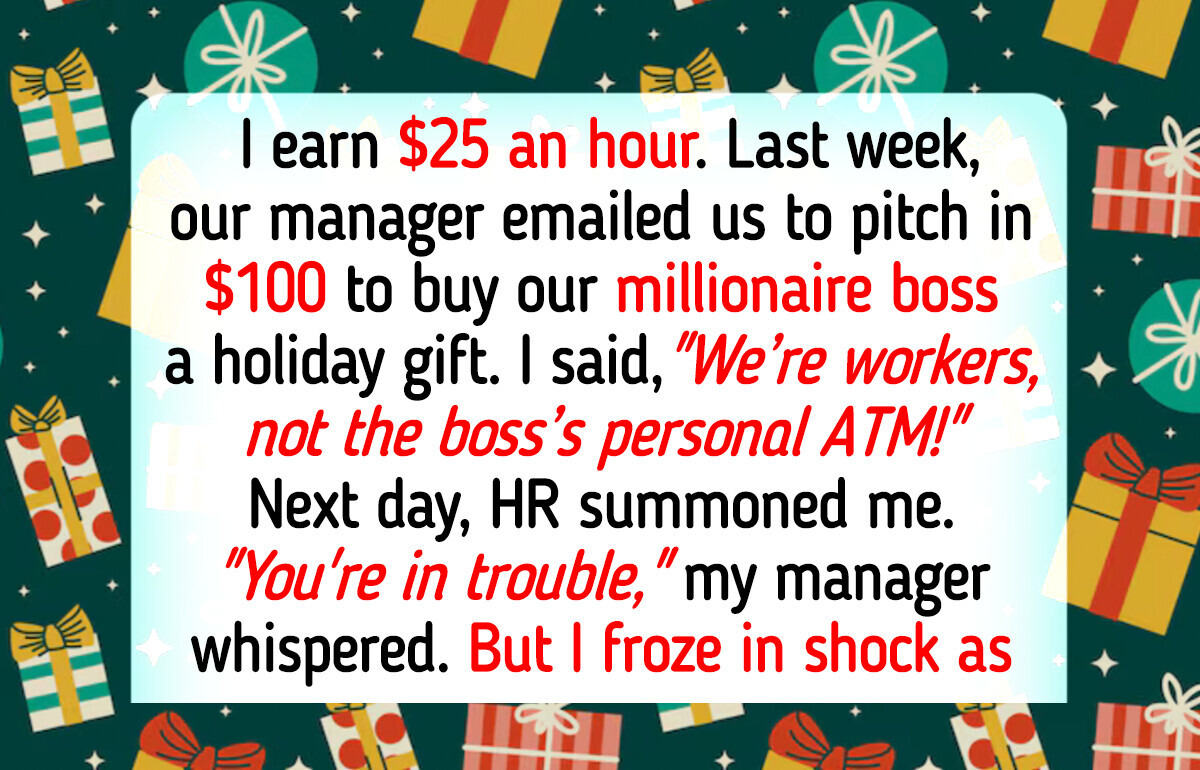
Workplace culture can be complicated—especially when power, money, and unspoken expectations collide. Many employees face uncomfortable situations that test their values, but aren’t sure how to speak up. Recently, a Bright Side reader sent us a letter about what happened when they finally did.

Here’s Noah’s letter:
Hi Bright Side,
I earn $25 an hour—no Christmas bonus, no holiday raise. Then last week, our manager sent out an email asking everyone to pitch in $100 to buy our millionaire boss a holiday gift. This man will never worry about how to afford Christmas presents for his kids, or whether he can afford gas to get to work, or if he’ll be able to keep the fridge full this month.
Meanwhile, the employees who are struggling were suddenly expected to donate more than they make in an hour—for his Christmas gift. I was stunned. Honestly, I was offended.
So I replied to the email. I said I wouldn’t be contributing and explained that the request felt inappropriate and unfair—especially during a time when people are barely getting by. Later, when coworkers asked why I wasn’t participating, I snapped out loud, “Workers shouldn’t be treated like the boss’s personal ATM.”
The next day, HR summoned me.
“You’re in trouble,” my manager whispered. I braced myself for a warning, a lecture about “team morale,” or some corporate speech about “workplace culture.”

But I froze in shock as HR closed the door, sat down across from me, folded their hands, and said, “We need your help.” I blinked. “My help?!” The HR rep lowered her voice, almost like we were in a spy movie.
I wasn’t the first employee to complain about the donation request—but I was the first to put something in writing that sounded like a “values-based objection.” And that, accidentally, triggered a mandatory review from the Corporate Social Responsibility division because my reply email got flagged by their new “Ethical Concerns & Sustainability” algorithm.
I had tripped a compliance wire without meaning to... Then HR slid a clipboard toward me—a petition. Not an official one. A secret one they were circulating to prove to upper management that the donation request was inappropriate, demoralizing, and potentially a PR nightmare.
They needed employee signatures to make the case—something HR couldn’t openly organize themselves. And then, even stranger, they asked me to serve as an anonymous “employee representative” for a confidential focus group about “toxic benevolence practices.” Whatever that meant... I walked out of the meeting completely stunned.
Now I’m honestly wondering: am I risking something by being in the middle of all this? Should I have stayed quiet like everyone else?
—Noah

Thank you, Noah, for sending us such a powerful and thought-provoking story. What started as a simple act of honesty revealed deeper issues many workers quietly endure. Here are 4 very different pieces of advice tailored to your unique situation, each offering a distinct path forward depending on your values, goals, and comfort level.
Stay Loud, but Stay Smart.
You’ve already taken a principled stand, which sparked a necessary conversation. Now channel that momentum with strategy, not just passion. Ask HR to clarify the boundaries of your new “employee representative” role to protect yourself from retaliation or misunderstanding. Keep written records of all interactions related to this issue, in case things escalate.
Be vocal, but avoid unnecessary drama with coworkers. HR might support you now, but workplace alliances shift fast. You’re not just speaking up for yourself anymore—you’ve become part of a much larger conversation, and it needs both your courage and your caution.
The Quiet Exit Strategy.
If this situation is already feeling too messy or emotionally draining, it’s okay to quietly step back before you’re pulled deeper into something that could become career-limiting. Thank HR for trusting you but express that you’re uncomfortable being a spokesperson and prefer to focus on your work.
Use this moment as a cue to start discreetly updating your résumé and scouting for companies with healthier cultures. Sometimes the best protest is to leave for a better-run ship. You’re not a sellout—you’re self-preserving.
Build a Quiet Coalition.
Now that you’re unofficially “on the radar,” take the chance to listen—really listen—to others who felt the same but stayed silent. Quietly connect with coworkers to see who shares your concerns, and document their stories (with permission) for potential use in HR’s case.
Being the only visible objector puts you at risk, but being the first in a group of voices can make you the leader of something important. Solidarity doesn’t always start with a protest sign—it often starts with whispered agreement in break rooms. Power is safer, and more effective, when it’s shared.
Use the System to Change the System.
You’ve stumbled into a rare position of influence. Use it wisely. Instead of thinking of yourself as a lone rebel, treat this like a systems-level opportunity to make policy changes around employee gifting and financial boundaries.
Ask HR if this “focus group” can result in formal recommendations or guidelines to prevent future missteps. Suggest a clearer, opt-in framework for workplace gifting, so lower-wage workers aren’t pressured to contribute beyond their means. This isn’t just about $100, it’s about dignity, transparency, and fairness for everyone.
Sometimes, life at work can take unexpected turns that make us question everything, from our career choices to the people we trust. Many of us face moments when our loyalty and courage are quietly tested, often in ways we don’t see coming.
I Refused to Be Underpaid—Then I Discovered My Boss’s Secret Plan
Comments
Related Reads
I Chose My Sick Son Over a Client Meeting—Now I’m Under Review
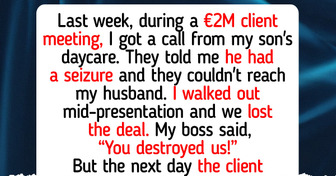
I Refuse to Do Extra Unpaid Work Just Because My Coworkers Are Incompetent
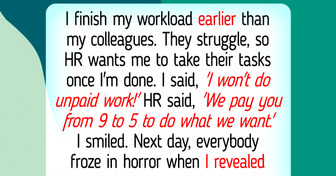
10 Stories So Kind They Warm a World Gone Cold

10 Moments That Prove Kindness Matters Even When the World Turns Against Us

My Boss Refused My Vacation—Then He Realized My Secret
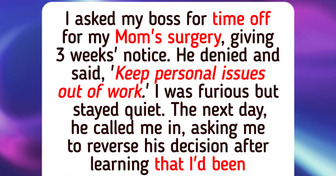
I Refused to Follow My Boss’s Dress Code—HR Had to Step In

10 Moments That Remind Us Kindness Matters Most When the World Gets Tough

I Refused to Expose My Salary to My Parents, Now My Life Is Falling Apart

I Refused to Train My New Colleague for Free, I’m Not a Charity
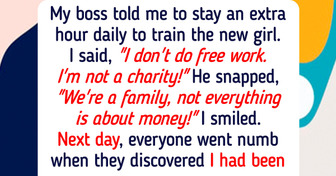
I Refuse to Be the Villain When My Boss Is the Real Time Thief

15 Moments That Show Kindness Is Quiet but Changes Everything

My Coworker Tried to Humiliate Me to Our Boss—I Had the Perfect Receipts

